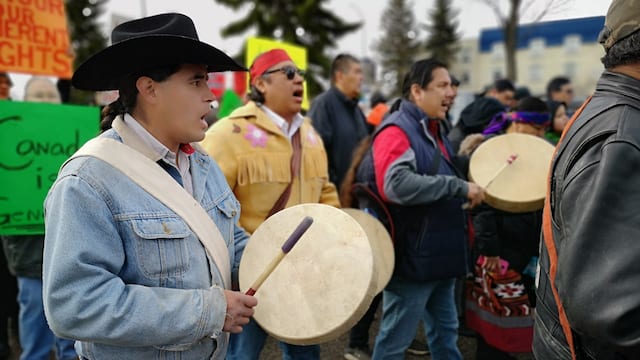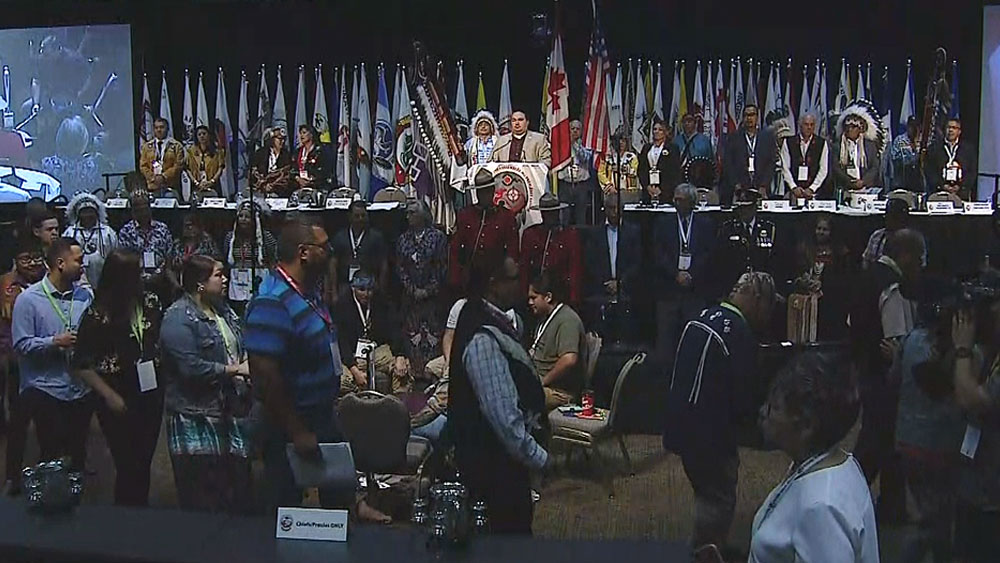
About 300 grassroots people, chiefs and elders gathered in Edmonton Wednesday to oppose the federal government and AFN-led review of major policies impacting First Nations. Justin Brake/APTN.

In what some claim will improve “transparency and accountability,” applicants vying to become the new Assembly of First Nations (AFN) regional chief for Nova Scotia and Newfoundland must “satisfactorily” pass child abuse and criminal record checks in each province.
The requirements are part of a two-page application posted by the chiefs of Nova Scotia-Newfoundland to replace Morley Googoo.
Googoo was regional chief for eight years but removed from the position last October after allegations of gender-based bullying.
Googoo has denied the allegations.
Legally and ethically
Darlene Okemaysim-Sicotte, with the group Women Talking Together, said communities need to know chiefs have been vetted legally and ethically.
“I’m really, really for that,” she said from Saskatoon. “This is a standard that can go all across the board, all across the country.
“That would make for better candidate selection and transparency and accountability.”
Membertou Chief Terry Paul, who speaks for the N.S.-Newfoundland region, didn’t respond to requests from APTN News to comment on the new requirements.
But AFN National Chief Perry Bellegarde praised the “high standard” being set by the eastern chiefs.
He told APTN they are following the example set by AFN head office in Ottawa last fall.
“The requirements for Regional Chief put forward by the Chiefs of Nova Scotia and Newfoundland are a positive step,” Bellegarde said in an emailed statement, “and are consistent with the spirit and intent of the Code of Conduct and Ethics for the Assembly of First Nations Executive Committee.”
New code
APTN was first to report on the AFN’s new code adopted after allegations against Googoo and some other chiefs broke last summer.
AFN spokesman Don Kelly said the code is part of “a broader effort on renewing the AFN Charter, but has a specific provision that speaks to the requirement of Regional Offices to adopt policy and procedures.”
Regional chiefs appoint or elect a representative to advocate on their behalf with the AFN in Ottawa.
They visit many communities and come into contact with people of all ages.
The eastern online application states candidates must have the ability to travel internationally and, at a minimum, high school education.
Knowledge of the Mi’kmaq language is considered an asset.
Three-year term
The posting also seeks a letter outlining why individuals want the job that pays six figures and starts with a three-year term.
The AFN said it has “zero tolerance” for harassment and violence of any kind.
“We all have a right to be safe,” added Okemaysim-Sicotte, who works with families of missing and murdered Indigenous women and girls.
“Not just in non-Indigenous communities or mainstream (communities) but in our own communities.”
Meanwhile, the Native Women’s Association of Canada (NWAC), which advocates for Indigenous women on issues of violence and sexual assault, declined an opportunity to comment on the regional chief requirements.
“Thanks again for emailing us,” a spokesperson said. “Unfortunately, it is the position of NWAC that we do not comment on the practices of the other National Indigenous Organizations.”











Indigenous reconciliation is important for everyone, I believe we can make this work together.
Too each their own.